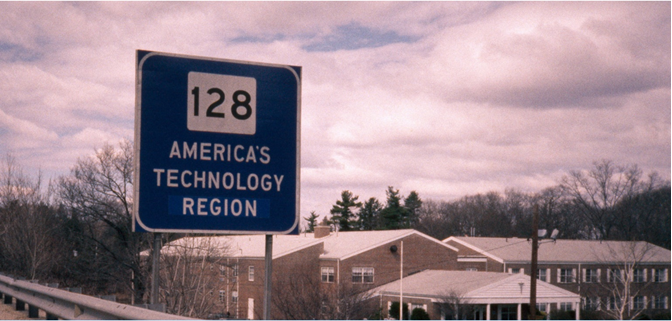When we think tech, we think Silicon Valley. That little piece of California just south of San Francisco has been the world’s most ubiquitously hyped tech hub. But long before Silicon Valley, back when the tech hype machine was still in its adolescence, there was another hub that in many ways enabled the framework for today’s Silicon Valley world, only from the other coast. The East Coast, West Coast thing started a long time ago in tech and, just like in hip hop, east coast seriously ruled for a long time.
In 1946, Paris-born immigrant and US Army Brigadier General George Doriot became the father of venture capital by founding American Research and Development Corporation. The first private equity venture capital firm, ARDC was intended to stimulate and support investment in business run by returning WWII soldiers. The beginnings of the hub were born. Yes, it was tightly coupled to the defense industry and the space race, but there were many other aspects that eventually enabled the consumer technology revolution.
The heavy industrial manufacturing spaces of 19th Century Massachusetts made way for the finer manufacturing spaces of electronics all along the Route 128 corridor. Sure, Bell Labs invented the first transistor in 1949, but it was then Cambridge-based Raytheon who first manufactured it successfully at scale. ARDC is credited with the first venture capital mega-win when its $2 million investment in 1957 became Digital Equipment Corp. In 1957, television was as “tech” and as cool as anything in Wired today, but tech wasn’t as glamorous and it certainly wasn’t supported by the same hype that our collective media can enable today. But it was the beginning of the electronic eyeball business which continues today on the world wide web, enabled by technology that in many cases came from the efforts in the Route 128 hub.
At that stage though, we were still figuring out hardware. Tech was still about real engineering, not simply content presentation infrastructure. The products of that hub had to work well, consistently, and reliably in fault intolerant environments. The space race and the cold war needed different operational tolerances than the dot com battle for America’s eyeballs and wallets. We were still figuring out chips, networking, and how to make things smaller, how to keep them from melting, and easier to move around.
A B2B revolution
The pre-dot com revolution was very much a B2B revolution. Computing still went from vendors to enterprises or institutions and operated for utility, not for amusement. At its core, it was about function. Form was nice, but only as far as it supported function. It was about engineering excellence and performance at scale under duress. Even computer graphics served manufacturing industries. The Steve Jobs’ dream was really just a pitch at the time. No one had any doubt that these were really not consumer products the way a VCR was. People talked about personal computers, but only people in the business actually had them or used them regularly outside work; your grandmother didn’t need a computer to pay her electric bill and never went to Facebook; she went to Bingo! And you can use a computer at work for distraction from work!
A B2C revolution
The dot com revolution was a B2C revolution and it wasn’t about function, ultimately it has been about content and its presentation in the service of selling eyeballs or selling to eyeballs or both at the same time. Form not function has the upper hand in this revolution. It’s all about keeping the consumer satisfied, clicking, and consuming effortlessly. And it’s working great.
So, what’s the problem?
The problem is that we have stopped solving B2B problems in the same way as before. B2B problems are being solved as B2C problems with a B2C approach because the B2B approach has way more complexity, takes longer to solve, and has lower margins and is a smaller company than say Facebook or Google. Never mind that most companies in history have been smaller than Facebook and Google and today’s Apple. Avid Media is a B2B play that started a revolution, a disruption, a paradigm shift as big as any, right in Tewksbury, Massachusetts; the reason you are able to so easily pay your bills online today started with eDocs, another B2B play from Natick, Massachusetts; let’s not even get into Analog Devices and the serious stuff.
Enterprises are rife with all the same issues and challenges of the pre-dot-com world, but we are trying to confront them with blogs and content presented in different forms, or function presented as content, and it’s working for some things, but not working for the really complex stuff, but it feels impolite to bring up in large groups.
It’s global level profits or bust.
We are not investing in difficult problems the same way we were in the hub of old. It’s global level profits or bust. There is little tolerance for problems that may take generations of products to solve. Venture capital wants a quick mega win based on hype. The Route 128 revolution was manned by engineers who lived among us and wanted to work hard on science projects and make some money too. Today’s tech leaders want a quick win, then they want to be mega-celebrities and live happily ever after on a private island. Everybody wants to go to Mars via space tourism! Never mind that we don’t know enough about healing the human body for it to survive long term in space and we are not working on that problem at all. The sort of medical breakthroughs that we need to live healthily and function in space are not-for-profit enough to get us there. All the money is in bladder control or containment. That market is huge!
Hyping our latest usage patterns of WWII era German rocket technology to get us to orbit is big business in the race to privatize the space delivery business and never mind that orbit isn’t really space, it’s elementary space practice; space doesn’t actually start until you left the moon behind 365 days ago.
It’s all out here for the solving.
Energy, environment, food, water, pollution, plastics are all huge, tasty B2B problems. However, B2B problems are not popular, and we still suck at them. For example, over 80% of enterprise software projects still fail to come in within their original cost-time-scope targets despite 30 years of hype and tools and process “innovation;” another notorious B2B problem.
We need to figure out how to make money solving hard problems again. Communicating and building consensus around complex issues is still incredibly hard and getting harder every day with the world’s increasing complexity. Energy, environment, food, water, pollution, plastics are all serious problems that need solving, but before we solve those, we need to figure out how to create and hold onto ever-growing consensus around the fundamental things like “will drinking this water kill me in a few years,” using the same technology we are currently using to be at each other’s throats. It’s all out here for the solving, although we may need to solve issues with our supporting economic models first. We have the most amazing communication system in human history, but it is unable to sustain certain types of small-scale journalism that are critical to the fabric of our civics.
Maybe all of those are a bunch of smaller than Google-Apple-Facebook B2B problems that when solved will create a bunch of really successful eyeball selling businesses like the last set of B2B solutions did. And maybe they can start again right here along Boston’s Route 128.


